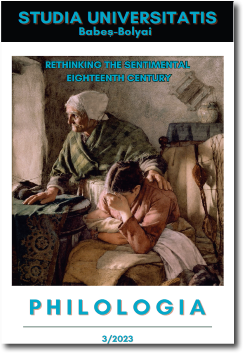(RE)CONSTRUCTING THE SELF IN WOMEN’S AUTOFICTION: THE CASE OF SAȘA ZARE’S DEZRĂDĂCINARE
DOI:
https://doi.org/10.24193/subbphilo.2023.3.14Keywords:
Saşa Zare, Romanian literature, autofiction, women’s writing, autotheory, metatextuality.Abstract
(Re)constructing the Self in Women’s Autofiction: The Case of Sașa Zare’s Dezrădăcinare. This paper aims to examine the (re)construction of the female subject in contemporary autobiographical fiction by looking into Sașa Zare’s debut novel, Dezrădăcinare. Drawing on feminist and postfeminist theory as well as research on self-writing centred on women’s inscription of personhood in their works, this study attempts to investigate the relationship between the narrator and the narrated self, focusing on the negotiated distance between the two fictional constructs. This analysis will build on concepts such as metatextuality, autotheory, performativity, and on Lacanian and post-Lacanian feminist means of understanding the self as a product of societal and cultural discourse (as opposed to the idea of a unified self), by centring on the narrative techniques that show the narrator’s perception of herself, and struggle to represent different parts of her identity (the writer, the daughter, the girlfriend, the student and the therapy patient). As language plays an important part in rendering the feminine subject’s fragmented vision of her identity, this paper will highlight the role of personal and societal narratives in constructing an idea of the self.
REZUMAT. (Re)construcția sinelui în autoficțiunea feminină: cazul romanului Dezrădăcinare de Sașa Zare. Această lucrare își propune o analiză a (re)construcției subiectului feminin în literatura contemporană de factură autobiografică, aplecându-se asupra romanului de debut al autoarei Sașa Zare, “Dezrădăcinare”. Pornind de la teorii feministe și postfeministe, precum și de la studii concentrate asupra inscripționării subiectului feminin în literatură, acest eseu va încerca să examineze relația dintre naratoare și sinele narat, accentul fiind plasat asupra distanței dintre cele două constructe ficționale. Studiul de caz propus pornește de la noțiuni precum metatextualitate, autoteorie, performativitate, dar și de la o paradigma feministă și postfeministă care valorizează tradiția psihanalitică (în special cea lacaniană și post-lacaniană). O astfel de poziționare critică deschide lucrarea spre o înțelegere a subiectul drept produs al practicilor discursive socio-culturale (perspectivă poziționată în opoziția tradiției care postulează unitatea absolută a sinelui). Analiza se va axa pe dificultatea naratoarei de a unifica diferite părți ale identității sale prin scris (autoarea, fiica, iubita, pacienta), subiectul feminin oferind o percepție fragmentată asupra propriului sine. Un rol important în redarea acestei viziuni este îndeplinit de către limbaj, motiv pentru care lucrarea de față va sublinia contribuția narațiunilor personale și societale în procesul formării sinelui ficțional.
Cuvinte-cheie: Sașa Zare, literatură română, autoficțiune, scriitură feminină, autoteorie, metatextualitate.
Article history: Received 20 June 2023; Revised 7 September 2023; Accepted 10 September 2023; Available online 30 September 2023; Available print 30 September 2023.
References
Bâlici, Mihnea, and Mihai Iovănel. 2022. “„Cine stabilește ce e literatura adevărată?”“ Scena9, (September). https://www.scena9.ro/article/cronica-sasa-zare-dezradacinare.
Carusi, Rahna M. 2020. Lacan and Critical Feminism. Subjectivity, Sexuation, and Discourse. New York: Icon, Totem Books.
Crețu, Bogdan. 2022. “Trauma și integrarea ei prin literatură (I).” Observatoru Cultural, (December). https://www.observatorcultural.ro/articol/trauma-si-integrarea-ei-prin-literatura-i/.
Fournier, Lauren. 2021. Autotheory as Feminist Practice in Art, Writing, and Criticism. Massachusetts: Massachusetts Institute of Technology.
Graham, Allen. 2000. Intertextuality. New York: Routledge.
Gratton, Johannie. “Autofiction.” In Encyclopedia of Life Writing, Vol. I A-K, 2001, edited by Margaretta Jolly. Chicago: Fitzroy Deaborn Publishers.
Kavka, Misha. “Feminism, Ethics, and History, or What Is the “Post” in Postfeminism?” Tulsa Studies in Women’s Literature vol 21, no 1 (Spring, 2002): 29-44.
Kristeva, Julia. 1980. Desire in Language: A Semiotic Approach to Literature and Art. Translated by Thomas Gora and Alice Jardine. New York: Columbia University Press.
Kristeva, Julia. 1984. Revolution in Poetic Language. Translated by Margaret Waller. New York: Columbia University Press.
Linda, Anderson. 2001. Autobiography. New York: Routledge.
Livia, Anna. 2003. ““One Man in Two is a Woman”: Linguistic Approaches to Gender in Literary Texts.” In The Handbook of Language and Gender, 142-159. New Jersey: Blackwell Publishing Ltd.
Machon, Josephine. 2009. (Syn)aesthetics. Redefining Visceral Performance. London: Palgrave Macmillan.
McRobbie, Angela. 2009. The Aftermath of Feminism. Gender, Culture and Social Change. London: Sage.
Moi, Toril. “Feminism, Postmodernism, and Style: Recent Feminist Criticism in the United States” Cultural Critique vol, no 9 (Spring, 1988): 3-22.
Saunders, Max. 2010. Self Impression: Life-Writing, Autobiografiction, and the Forms of Modern Literature. Oxford: Oxford University Press.
Sheringham, Michael. “France: 20th-Century Auto/Biography.” In Encyclopedia of Life Writing, Vol. I A-K, 2001, edited by Margaretta Jolly. Chicago: Fitzroy Deaborn Publishers.
Tasker, Yvonne, and Diane Negra (eds.). Interrogating Postfeminism. Gender and the Politics of Popular Culture. Durrham: Duke University Press.
Waugh, Patricia. 1984. The Theory and Practice of Self-Conscious Fiction. New York: Routledge.
Wright, Elizabeth. 2000. Lacan and Postfeminism. London: Icon Books.
Zare, Sașa. 2022. Dezrădăcinare. București: frACTalia.
Downloads
Published
How to Cite
Issue
Section
License
Copyright (c) 2023 Studia Universitatis Babeș-Bolyai Philologia

This work is licensed under a Creative Commons Attribution-NonCommercial-NoDerivatives 4.0 International License.





 ©Studia Universitatis Babeş-Bolyai Philologia. Published by Babeș-Bolyai University.
©Studia Universitatis Babeş-Bolyai Philologia. Published by Babeș-Bolyai University.